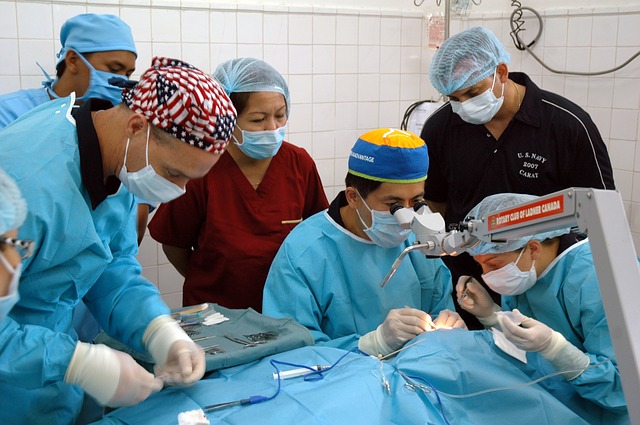- Calls to this hotline are currently being directed to Within Health, Fay or Eating Disorder Solutions
- Representatives are standing by 24/7 to help answer your questions
- All calls are confidential and HIPAA compliant
- There is no obligation or cost to call
- Eating Disorder Hope does not receive any commissions or fees dependent upon which provider you select
- Additional treatment providers are located on our directory or samhsa.gov
Bariatric Surgery and How to Address Underlying Eating Disorders

Today, increased numbers of Americans are turning to bariatric surgery as a means of dealing with obesity. The Center for Disease Control has estimated that the obesity rate in America is between twenty-six and thirty-two percent, which comes down to about one in three Americans [1].
In general, this “Obesity Epidemic” that our country has experienced has created tremendous fear, misunderstanding, and stigma about being overweight and/or obese.
Fear associated with potential health risks from obesity and the emotional distress that many obese individuals struggle with due to their size often leads to dramatic steps for weight loss.
Some of the common health concerns that may result from obesity include cardiovascular disease, stroke, congestive heart failure, and Type 2 diabetes.
Bariatric Surgery For Weight Loss
Many individuals who are obese may turn to various forms of bariatric surgery for weight loss, including gastric banding, gastric sleeve surgery, duodenal switch, revisional surgery, and the most popular being the Roux-en-Y gastric bypass.
Bariatric surgery typically results in significant weight loss, largely attributed to the restriction of food intake, malabsorption of ingested food, or a combination of the two [2]. In conjunction with the growing obesity epidemic observed, the rate of bariatric surgeries has increased from 13,000 procedures in 1998 to over 220,000 by 2008 [3].
With the prevalence of bariatric surgeries for obesity, it is important to understand the pros, cons, and risks involved. Bariatric surgery has not been proven as a solution for obesity, yet many people view it as such.
Incidentally, an increased number of individuals who are seeking bariatric surgery may also be at risk for an eating disorder, which can severely complicate health risks, particularly if one elects to have bariatric surgery. While many bariatric clinics do complete screenings for individuals with eating disorders prior to surgery, many susceptible individuals may still pass screenings and become eligible for these procedures.
Connection to Eating Disorders
In a study of almost three-hundred obese individuals who qualified for gastric bypass surgery, nearly sixty-six percent had a lifetime history of an eating disorder, with forty-eight percent meeting the diagnostic criteria for binge eating disorder [4]. Other studies have identified that over thirty-five percent of individuals who struggled with binge eating prior to surgery continued to feel out of control with eating habits up to fifteen years after surgery [4].
 In the case of an eating disorder, like binge eating disorder, these conditions are chronic psychiatric illnesses that will continue to persistent after bariatric surgery, particularly if appropriate treatment is not sought.
In the case of an eating disorder, like binge eating disorder, these conditions are chronic psychiatric illnesses that will continue to persistent after bariatric surgery, particularly if appropriate treatment is not sought.
In many instances where an eating disorder is present, there is a tendency to hyperfocus on body size and weight. If obesity has resulted from abnormal eating behaviors connected with an eating disorder, there is a tremendous amount of shame, guilt, and embarrassment that surrounds one’s body, size, weight, etc.
Some individuals who may be suffering may rationalize that weight loss is the key to feeling better about themselves, being accepted, loved, successful and more.
However, the reality is that there are several complex factors contributing to eating disorders, including both biological and environmental. Bariatric surgery may help achieve weight loss, but weight loss is not a means for resolving an underlying eating disorder.
Connecting to Comprehensive Care
In the face of an eating disorder, comprehensive care is critical for recovery and fullness in life. Weight loss is often marketed as a “cure-all” for many complicated issues, but this is nothing more than a ploy driven by a billion dollar dieting industry. While there are some individuals who are appropriate for and may benefit from bariatric surgery, this is something that should be professionally considered when an underlying eating disorder is also present.
If you or someone you care for has struggled with an eating disorder and resulting obesity, be sure to seek out specialized help for the issues you are facing. While bariatric surgery may seem like a quick fix to an overwhelming problem, this could further complicate underlying eating disorder issues for years to come.
Consider talking with an eating disorder specialist about the issues you are currently facing and the options to consider. Normalizing your eating habits and developing an overall healthy relationship with food and body is an important step before considering bariatric surgery.
References:
[1]: Centers for Disease Control and Prevention, “Overweight and Obesity – Data and Statistics”, https://www.cdc.gov/obesity/data/index.html Accessed 2nd May 2017
[2]: Zhang H, DiBaise JK, Zuccolo A, Kudrna D, Braidotti M, Yu Y, Parameswaran P, Crowell MD, Wing R, Rittmann BE, Krajmalnik-Brown R. Human gut microbiota in obesity and after gastric bypass. Proc Natl Acad Sci USA. 2009;106:2365–70. doi: 10.1073/pnas.0812600106.
[3]: Madura, J. A., & DiBaise, J. K. (2012). Quick fix or long-term cure? Pros and cons of bariatric surgery. F1000 Medicine Reports, 4, 19. http://doi.org/10.3410/M4-19
[4]: Bariatric Surgery and Binge Eating Disorder: The Risks Vs. Rewards, https://www.waldeneatingdisorders.com/bariatric-surgery-and-binge-eating-disorder-the-risks-vs-rewards/ Accessed 2nd May 2017
 About the Author: Crystal is a Masters-level Registered Dietitian Nutritionist (RDN) with a specialty focus in eating disorders, maternal/child health and wellness, and intuitive eating. Combining clinical experience with a love of social media and writing, Crystal serves where her passion to help others find recovery and healing is integrated into each part of her work.
About the Author: Crystal is a Masters-level Registered Dietitian Nutritionist (RDN) with a specialty focus in eating disorders, maternal/child health and wellness, and intuitive eating. Combining clinical experience with a love of social media and writing, Crystal serves where her passion to help others find recovery and healing is integrated into each part of her work.
As a Certified Intuitive Eating Counselor, Crystal has dedicated her career to helping others establish a healthy relationship with food and body through her nutrition private practice.
The opinions and views of our guest contributors are shared to provide a broad perspective of eating disorders. These are not necessarily the views of Eating Disorder Hope, but an effort to offer discussion of various issues by different concerned individuals.
We at Eating Disorder Hope understand that eating disorders result from a combination of environmental and genetic factors. If you or a loved one are suffering from an eating disorder, please know that there is hope for you, and seek immediate professional help.
Published on May 7, 2017.
Reviewed By: Jacquelyn Ekern, MS, LPC on May 7, 2017.
Published on EatingDisorderHope.com

The EatingDisorderHope.com editorial team comprises experienced writers, editors, and medical reviewers specializing in eating disorders, treatment, and mental and behavioral health.

